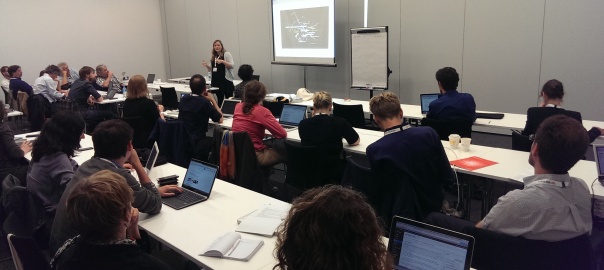During the DH2014 conference in Lausanne held from 8th to 12th of July the Erasmus Studio, based at the Erasmus School for History, Culture and Communication in Rotterdam, organised a workshop to assess strategies on how to expand the role of audiovisual media in the field of Digital Humanities. A Storify of all tweets related to the workshop can be found here. Abstracts of presented papers can be found here. Below is a wrap-up written by Stef Scagliola.
The goal of the workshop was ambitious. We intended to reach out to frontrunners that cover the variety of modalities within audiovisual data: video, film, radio, television, photography and oral history. At the same time we were looking for examples of digital tools that are available at the different subsequent stages of the research process: first exploration/annotation, then analysis, followed by presentation, and finally preservation and curation for the long term. A last goal was to mirror the diversity of disciplines that make use of audiovisual sources: media history, anthropology, ethnography, iconography, sound studies, archival- and library studies, information science and computer science.
The first keynote speaker, Andreas Fickers of the University of Luxembourg provided an epistemological and ontological context for understanding the complexity of research on digital audiovisual material. Fickers has been appointed as professor at one of the few humanities faculties in Europe where AV media has been completely integrated in the general history curriculum. This policy has been pursued to anticipate the envisioned future need for audiovisual literacy and online scholarship. (slides PDF)
The second keynote speaker, speech technologist Arjan van Hessen, offered an encouraging perspective. According to him many technical solutions are actually already available, but an effective use of them is hampered by lack of communication. In his view bridging the gap in methodology between humanities and technology requires a heavy long term investment in co-development and dialogue. Resources have to be ensured for these activities at the very beginning of the conceptualisation of a research project, as they are not part of the traditional academic social practices and will not develop spontaneously. (slides PDF)
A number of other fundamental concerns were put forward in the discussion. One regards the heavy burden that academic driven digital projects put on available resources of universities in the long run. The requirements for long term sustainability are usually not addressed in projects that provide proof of concept results, particularly in cases that involve needs for heavy storage such as film and video. It is important to consider the development of business models in order to deal with the financial burden that has already been put on public resources by the many DH projects that have to be kept running. A second relevant observation was the tension felt between the experimental phase in which Digital Humanities is at present, and the need to deliver sound research outcomes that meet professional academic standards. A third point regarded the pedagogical need for present and next generations of students of complementing textual literacy with visual and aural literacy. Awareness on the impact of digital technology on the character and value of information should be part and parcel of any academic education.
The nine papers and demo’s offered a rich array of topics, from image recognition and video annotation, to radio- and sound analysis. But rather than providing solutions to the presented key questions, the audience was challenged to rethink and further develop specific concepts and techniques.
Below a brief description of the papers is presented.
